Hacktivism and Hacking: Understanding the Concepts and Impacts
VerifiedAdded on 2022/11/14
|8
|2043
|355
Essay
AI Summary
This essay provides a comprehensive analysis of hacktivism and hacking, exploring their distinct characteristics and societal impacts. It begins by defining hacking as unauthorized access to computer systems, often for financial gain or malicious purposes, and contrasts it with hacktivism, which employs similar techniques but is driven by social or political motivations. The essay delves into the ethical considerations, legal ramifications, and various forms of hacktivism, including examples like WikiLeaks and Anonymous. It examines the motivations behind hacktivist actions, the potential benefits such as raising public awareness and promoting data protection, and the inherent risks, including security vulnerabilities and collateral damage. The essay further differentiates hacktivism from social disobedience, highlighting their similarities and differences in terms of methods and objectives, ultimately positioning hacktivism as a complex form of digital activism with significant implications for cybersecurity and social change. The analysis includes a detailed bibliography of relevant academic sources.

Running head: HACKTIVISM AND HACKING
Hacktivism and Hacking
[Name of the Student]
[Name of the University]
[Author Note]
Hacktivism and Hacking
[Name of the Student]
[Name of the University]
[Author Note]
Paraphrase This Document
Need a fresh take? Get an instant paraphrase of this document with our AI Paraphraser
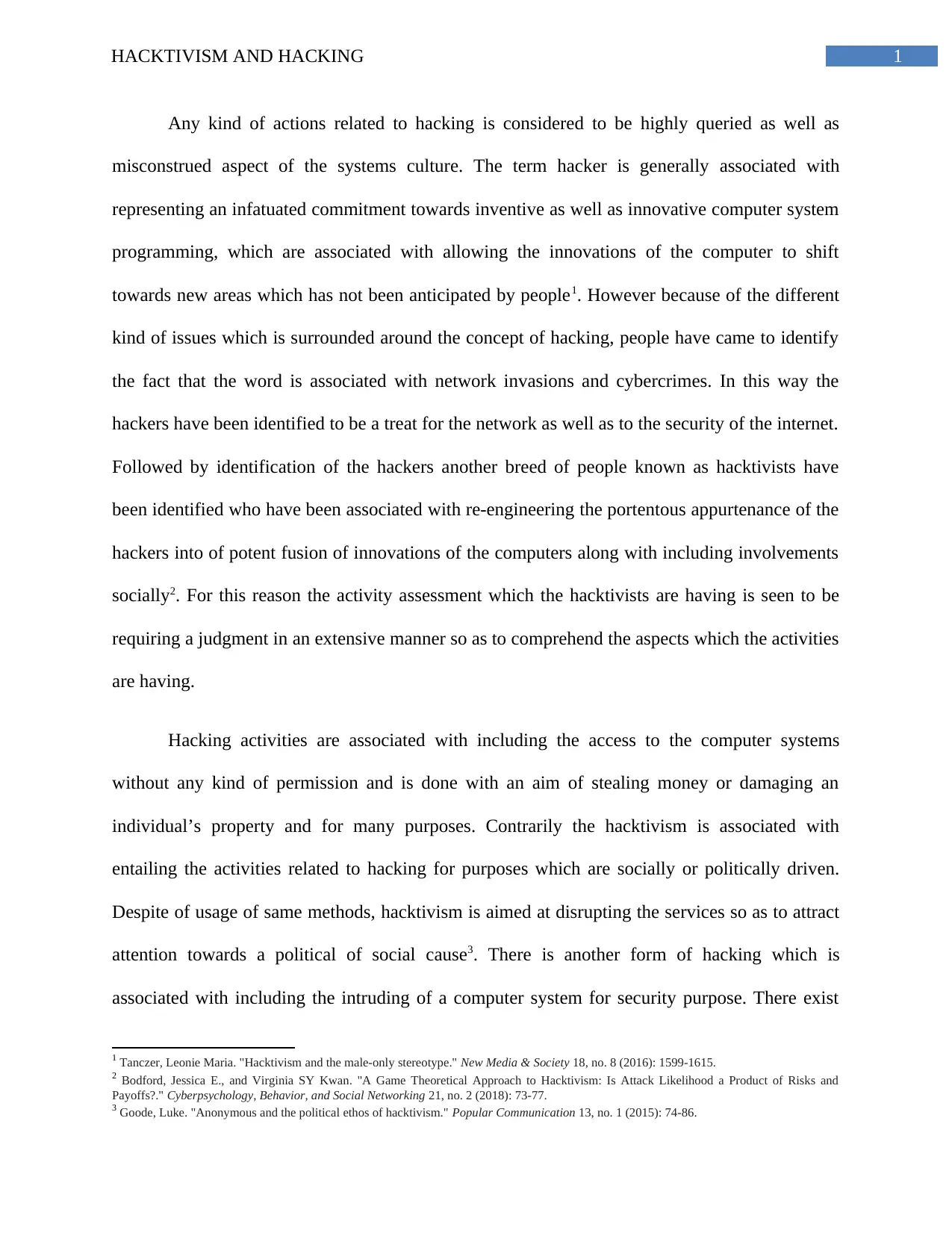
1HACKTIVISM AND HACKING
Any kind of actions related to hacking is considered to be highly queried as well as
misconstrued aspect of the systems culture. The term hacker is generally associated with
representing an infatuated commitment towards inventive as well as innovative computer system
programming, which are associated with allowing the innovations of the computer to shift
towards new areas which has not been anticipated by people1. However because of the different
kind of issues which is surrounded around the concept of hacking, people have came to identify
the fact that the word is associated with network invasions and cybercrimes. In this way the
hackers have been identified to be a treat for the network as well as to the security of the internet.
Followed by identification of the hackers another breed of people known as hacktivists have
been identified who have been associated with re-engineering the portentous appurtenance of the
hackers into of potent fusion of innovations of the computers along with including involvements
socially2. For this reason the activity assessment which the hacktivists are having is seen to be
requiring a judgment in an extensive manner so as to comprehend the aspects which the activities
are having.
Hacking activities are associated with including the access to the computer systems
without any kind of permission and is done with an aim of stealing money or damaging an
individual’s property and for many purposes. Contrarily the hacktivism is associated with
entailing the activities related to hacking for purposes which are socially or politically driven.
Despite of usage of same methods, hacktivism is aimed at disrupting the services so as to attract
attention towards a political of social cause3. There is another form of hacking which is
associated with including the intruding of a computer system for security purpose. There exist
1 Tanczer, Leonie Maria. "Hacktivism and the male-only stereotype." New Media & Society 18, no. 8 (2016): 1599-1615.
2 Bodford, Jessica E., and Virginia SY Kwan. "A Game Theoretical Approach to Hacktivism: Is Attack Likelihood a Product of Risks and
Payoffs?." Cyberpsychology, Behavior, and Social Networking 21, no. 2 (2018): 73-77.
3 Goode, Luke. "Anonymous and the political ethos of hacktivism." Popular Communication 13, no. 1 (2015): 74-86.
Any kind of actions related to hacking is considered to be highly queried as well as
misconstrued aspect of the systems culture. The term hacker is generally associated with
representing an infatuated commitment towards inventive as well as innovative computer system
programming, which are associated with allowing the innovations of the computer to shift
towards new areas which has not been anticipated by people1. However because of the different
kind of issues which is surrounded around the concept of hacking, people have came to identify
the fact that the word is associated with network invasions and cybercrimes. In this way the
hackers have been identified to be a treat for the network as well as to the security of the internet.
Followed by identification of the hackers another breed of people known as hacktivists have
been identified who have been associated with re-engineering the portentous appurtenance of the
hackers into of potent fusion of innovations of the computers along with including involvements
socially2. For this reason the activity assessment which the hacktivists are having is seen to be
requiring a judgment in an extensive manner so as to comprehend the aspects which the activities
are having.
Hacking activities are associated with including the access to the computer systems
without any kind of permission and is done with an aim of stealing money or damaging an
individual’s property and for many purposes. Contrarily the hacktivism is associated with
entailing the activities related to hacking for purposes which are socially or politically driven.
Despite of usage of same methods, hacktivism is aimed at disrupting the services so as to attract
attention towards a political of social cause3. There is another form of hacking which is
associated with including the intruding of a computer system for security purpose. There exist
1 Tanczer, Leonie Maria. "Hacktivism and the male-only stereotype." New Media & Society 18, no. 8 (2016): 1599-1615.
2 Bodford, Jessica E., and Virginia SY Kwan. "A Game Theoretical Approach to Hacktivism: Is Attack Likelihood a Product of Risks and
Payoffs?." Cyberpsychology, Behavior, and Social Networking 21, no. 2 (2018): 73-77.
3 Goode, Luke. "Anonymous and the political ethos of hacktivism." Popular Communication 13, no. 1 (2015): 74-86.
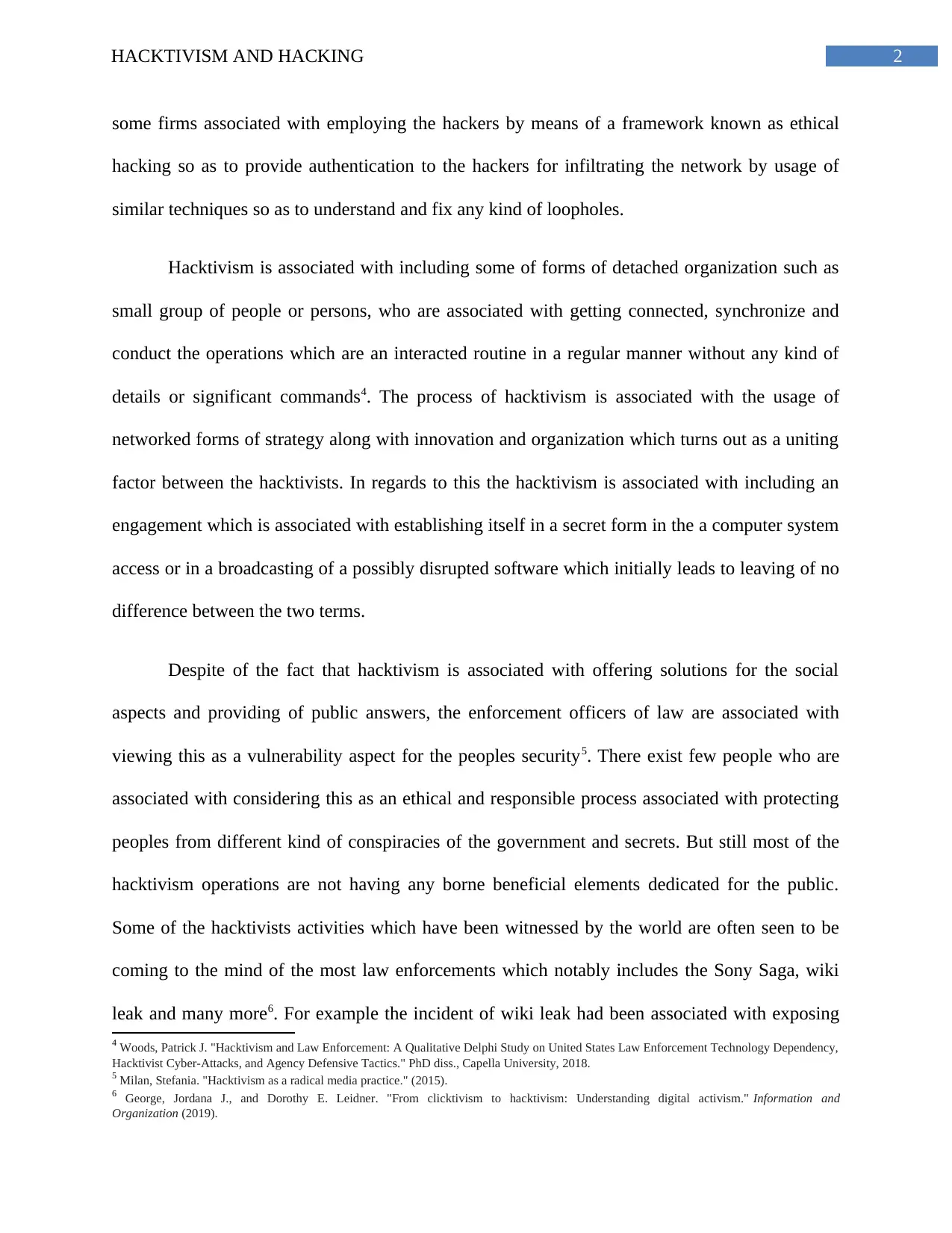
2HACKTIVISM AND HACKING
some firms associated with employing the hackers by means of a framework known as ethical
hacking so as to provide authentication to the hackers for infiltrating the network by usage of
similar techniques so as to understand and fix any kind of loopholes.
Hacktivism is associated with including some of forms of detached organization such as
small group of people or persons, who are associated with getting connected, synchronize and
conduct the operations which are an interacted routine in a regular manner without any kind of
details or significant commands4. The process of hacktivism is associated with the usage of
networked forms of strategy along with innovation and organization which turns out as a uniting
factor between the hacktivists. In regards to this the hacktivism is associated with including an
engagement which is associated with establishing itself in a secret form in the a computer system
access or in a broadcasting of a possibly disrupted software which initially leads to leaving of no
difference between the two terms.
Despite of the fact that hacktivism is associated with offering solutions for the social
aspects and providing of public answers, the enforcement officers of law are associated with
viewing this as a vulnerability aspect for the peoples security5. There exist few people who are
associated with considering this as an ethical and responsible process associated with protecting
peoples from different kind of conspiracies of the government and secrets. But still most of the
hacktivism operations are not having any borne beneficial elements dedicated for the public.
Some of the hacktivists activities which have been witnessed by the world are often seen to be
coming to the mind of the most law enforcements which notably includes the Sony Saga, wiki
leak and many more6. For example the incident of wiki leak had been associated with exposing
4 Woods, Patrick J. "Hacktivism and Law Enforcement: A Qualitative Delphi Study on United States Law Enforcement Technology Dependency,
Hacktivist Cyber-Attacks, and Agency Defensive Tactics." PhD diss., Capella University, 2018.
5 Milan, Stefania. "Hacktivism as a radical media practice." (2015).
6 George, Jordana J., and Dorothy E. Leidner. "From clicktivism to hacktivism: Understanding digital activism." Information and
Organization (2019).
some firms associated with employing the hackers by means of a framework known as ethical
hacking so as to provide authentication to the hackers for infiltrating the network by usage of
similar techniques so as to understand and fix any kind of loopholes.
Hacktivism is associated with including some of forms of detached organization such as
small group of people or persons, who are associated with getting connected, synchronize and
conduct the operations which are an interacted routine in a regular manner without any kind of
details or significant commands4. The process of hacktivism is associated with the usage of
networked forms of strategy along with innovation and organization which turns out as a uniting
factor between the hacktivists. In regards to this the hacktivism is associated with including an
engagement which is associated with establishing itself in a secret form in the a computer system
access or in a broadcasting of a possibly disrupted software which initially leads to leaving of no
difference between the two terms.
Despite of the fact that hacktivism is associated with offering solutions for the social
aspects and providing of public answers, the enforcement officers of law are associated with
viewing this as a vulnerability aspect for the peoples security5. There exist few people who are
associated with considering this as an ethical and responsible process associated with protecting
peoples from different kind of conspiracies of the government and secrets. But still most of the
hacktivism operations are not having any borne beneficial elements dedicated for the public.
Some of the hacktivists activities which have been witnessed by the world are often seen to be
coming to the mind of the most law enforcements which notably includes the Sony Saga, wiki
leak and many more6. For example the incident of wiki leak had been associated with exposing
4 Woods, Patrick J. "Hacktivism and Law Enforcement: A Qualitative Delphi Study on United States Law Enforcement Technology Dependency,
Hacktivist Cyber-Attacks, and Agency Defensive Tactics." PhD diss., Capella University, 2018.
5 Milan, Stefania. "Hacktivism as a radical media practice." (2015).
6 George, Jordana J., and Dorothy E. Leidner. "From clicktivism to hacktivism: Understanding digital activism." Information and
Organization (2019).
⊘ This is a preview!⊘
Do you want full access?
Subscribe today to unlock all pages.

Trusted by 1+ million students worldwide
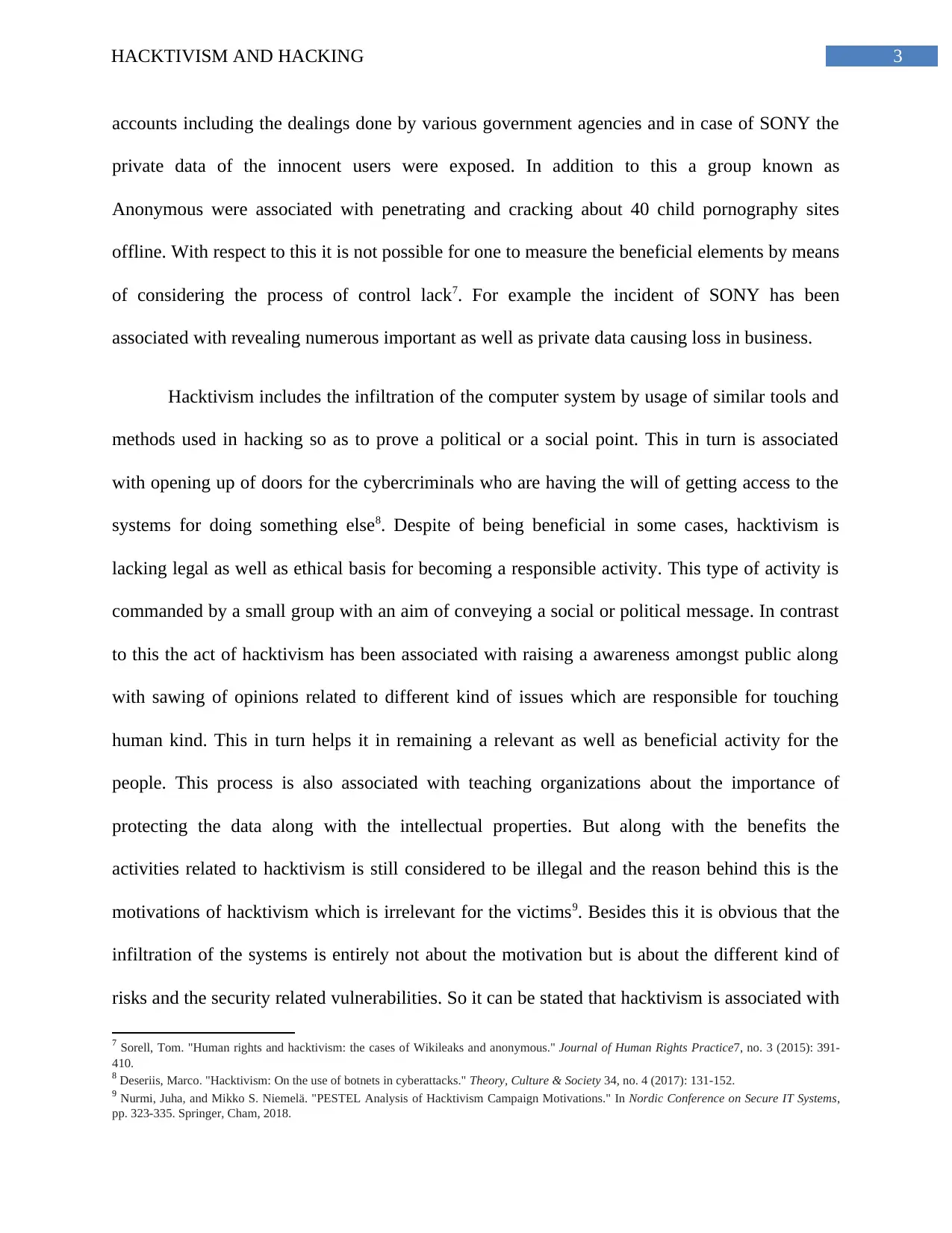
3HACKTIVISM AND HACKING
accounts including the dealings done by various government agencies and in case of SONY the
private data of the innocent users were exposed. In addition to this a group known as
Anonymous were associated with penetrating and cracking about 40 child pornography sites
offline. With respect to this it is not possible for one to measure the beneficial elements by means
of considering the process of control lack7. For example the incident of SONY has been
associated with revealing numerous important as well as private data causing loss in business.
Hacktivism includes the infiltration of the computer system by usage of similar tools and
methods used in hacking so as to prove a political or a social point. This in turn is associated
with opening up of doors for the cybercriminals who are having the will of getting access to the
systems for doing something else8. Despite of being beneficial in some cases, hacktivism is
lacking legal as well as ethical basis for becoming a responsible activity. This type of activity is
commanded by a small group with an aim of conveying a social or political message. In contrast
to this the act of hacktivism has been associated with raising a awareness amongst public along
with sawing of opinions related to different kind of issues which are responsible for touching
human kind. This in turn helps it in remaining a relevant as well as beneficial activity for the
people. This process is also associated with teaching organizations about the importance of
protecting the data along with the intellectual properties. But along with the benefits the
activities related to hacktivism is still considered to be illegal and the reason behind this is the
motivations of hacktivism which is irrelevant for the victims9. Besides this it is obvious that the
infiltration of the systems is entirely not about the motivation but is about the different kind of
risks and the security related vulnerabilities. So it can be stated that hacktivism is associated with
7 Sorell, Tom. "Human rights and hacktivism: the cases of Wikileaks and anonymous." Journal of Human Rights Practice7, no. 3 (2015): 391-
410.
8 Deseriis, Marco. "Hacktivism: On the use of botnets in cyberattacks." Theory, Culture & Society 34, no. 4 (2017): 131-152.
9 Nurmi, Juha, and Mikko S. Niemelä. "PESTEL Analysis of Hacktivism Campaign Motivations." In Nordic Conference on Secure IT Systems,
pp. 323-335. Springer, Cham, 2018.
accounts including the dealings done by various government agencies and in case of SONY the
private data of the innocent users were exposed. In addition to this a group known as
Anonymous were associated with penetrating and cracking about 40 child pornography sites
offline. With respect to this it is not possible for one to measure the beneficial elements by means
of considering the process of control lack7. For example the incident of SONY has been
associated with revealing numerous important as well as private data causing loss in business.
Hacktivism includes the infiltration of the computer system by usage of similar tools and
methods used in hacking so as to prove a political or a social point. This in turn is associated
with opening up of doors for the cybercriminals who are having the will of getting access to the
systems for doing something else8. Despite of being beneficial in some cases, hacktivism is
lacking legal as well as ethical basis for becoming a responsible activity. This type of activity is
commanded by a small group with an aim of conveying a social or political message. In contrast
to this the act of hacktivism has been associated with raising a awareness amongst public along
with sawing of opinions related to different kind of issues which are responsible for touching
human kind. This in turn helps it in remaining a relevant as well as beneficial activity for the
people. This process is also associated with teaching organizations about the importance of
protecting the data along with the intellectual properties. But along with the benefits the
activities related to hacktivism is still considered to be illegal and the reason behind this is the
motivations of hacktivism which is irrelevant for the victims9. Besides this it is obvious that the
infiltration of the systems is entirely not about the motivation but is about the different kind of
risks and the security related vulnerabilities. So it can be stated that hacktivism is associated with
7 Sorell, Tom. "Human rights and hacktivism: the cases of Wikileaks and anonymous." Journal of Human Rights Practice7, no. 3 (2015): 391-
410.
8 Deseriis, Marco. "Hacktivism: On the use of botnets in cyberattacks." Theory, Culture & Society 34, no. 4 (2017): 131-152.
9 Nurmi, Juha, and Mikko S. Niemelä. "PESTEL Analysis of Hacktivism Campaign Motivations." In Nordic Conference on Secure IT Systems,
pp. 323-335. Springer, Cham, 2018.
Paraphrase This Document
Need a fresh take? Get an instant paraphrase of this document with our AI Paraphraser
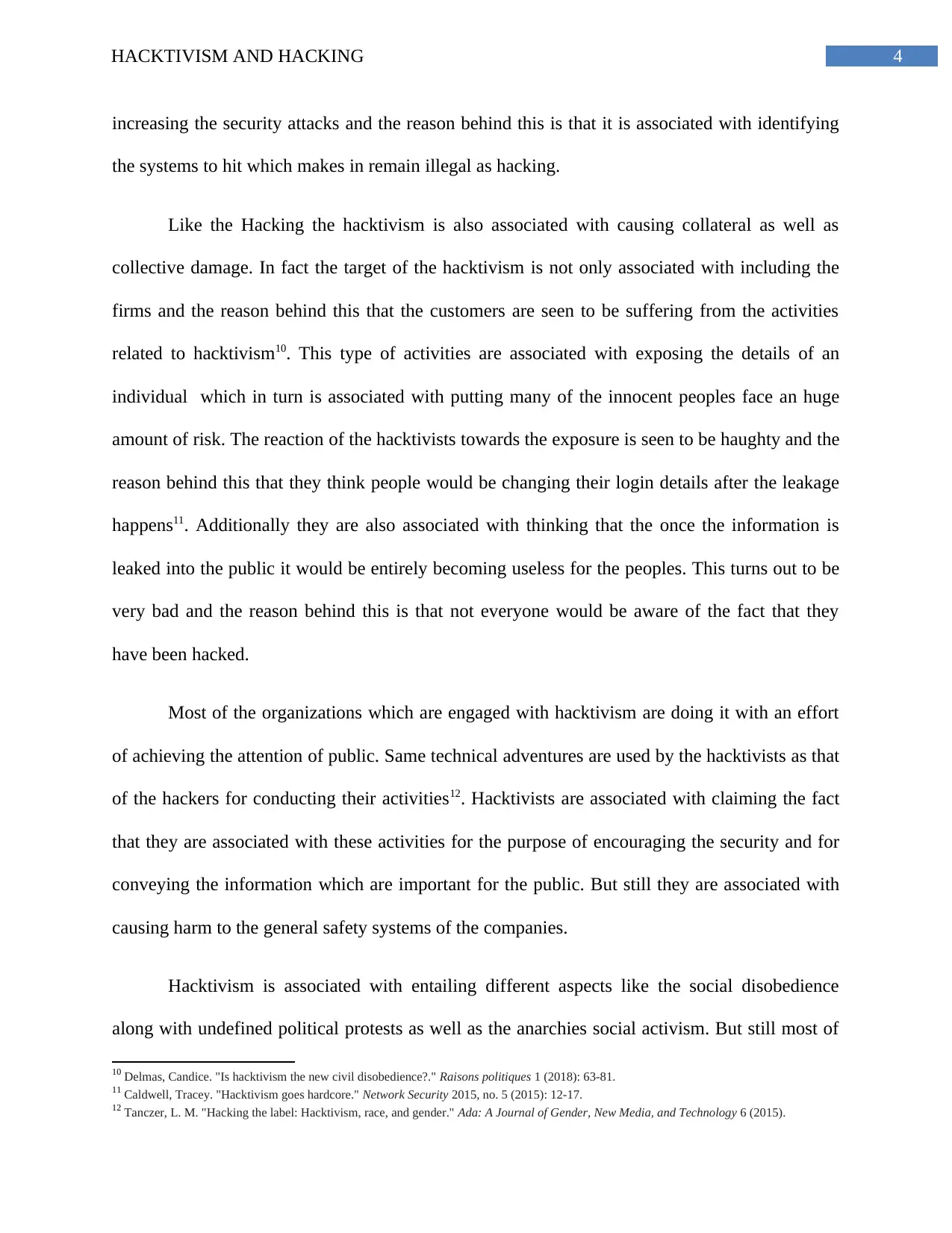
4HACKTIVISM AND HACKING
increasing the security attacks and the reason behind this is that it is associated with identifying
the systems to hit which makes in remain illegal as hacking.
Like the Hacking the hacktivism is also associated with causing collateral as well as
collective damage. In fact the target of the hacktivism is not only associated with including the
firms and the reason behind this that the customers are seen to be suffering from the activities
related to hacktivism10. This type of activities are associated with exposing the details of an
individual which in turn is associated with putting many of the innocent peoples face an huge
amount of risk. The reaction of the hacktivists towards the exposure is seen to be haughty and the
reason behind this that they think people would be changing their login details after the leakage
happens11. Additionally they are also associated with thinking that the once the information is
leaked into the public it would be entirely becoming useless for the peoples. This turns out to be
very bad and the reason behind this is that not everyone would be aware of the fact that they
have been hacked.
Most of the organizations which are engaged with hacktivism are doing it with an effort
of achieving the attention of public. Same technical adventures are used by the hacktivists as that
of the hackers for conducting their activities12. Hacktivists are associated with claiming the fact
that they are associated with these activities for the purpose of encouraging the security and for
conveying the information which are important for the public. But still they are associated with
causing harm to the general safety systems of the companies.
Hacktivism is associated with entailing different aspects like the social disobedience
along with undefined political protests as well as the anarchies social activism. But still most of
10 Delmas, Candice. "Is hacktivism the new civil disobedience?." Raisons politiques 1 (2018): 63-81.
11 Caldwell, Tracey. "Hacktivism goes hardcore." Network Security 2015, no. 5 (2015): 12-17.
12 Tanczer, L. M. "Hacking the label: Hacktivism, race, and gender." Ada: A Journal of Gender, New Media, and Technology 6 (2015).
increasing the security attacks and the reason behind this is that it is associated with identifying
the systems to hit which makes in remain illegal as hacking.
Like the Hacking the hacktivism is also associated with causing collateral as well as
collective damage. In fact the target of the hacktivism is not only associated with including the
firms and the reason behind this that the customers are seen to be suffering from the activities
related to hacktivism10. This type of activities are associated with exposing the details of an
individual which in turn is associated with putting many of the innocent peoples face an huge
amount of risk. The reaction of the hacktivists towards the exposure is seen to be haughty and the
reason behind this that they think people would be changing their login details after the leakage
happens11. Additionally they are also associated with thinking that the once the information is
leaked into the public it would be entirely becoming useless for the peoples. This turns out to be
very bad and the reason behind this is that not everyone would be aware of the fact that they
have been hacked.
Most of the organizations which are engaged with hacktivism are doing it with an effort
of achieving the attention of public. Same technical adventures are used by the hacktivists as that
of the hackers for conducting their activities12. Hacktivists are associated with claiming the fact
that they are associated with these activities for the purpose of encouraging the security and for
conveying the information which are important for the public. But still they are associated with
causing harm to the general safety systems of the companies.
Hacktivism is associated with entailing different aspects like the social disobedience
along with undefined political protests as well as the anarchies social activism. But still most of
10 Delmas, Candice. "Is hacktivism the new civil disobedience?." Raisons politiques 1 (2018): 63-81.
11 Caldwell, Tracey. "Hacktivism goes hardcore." Network Security 2015, no. 5 (2015): 12-17.
12 Tanczer, L. M. "Hacking the label: Hacktivism, race, and gender." Ada: A Journal of Gender, New Media, and Technology 6 (2015).
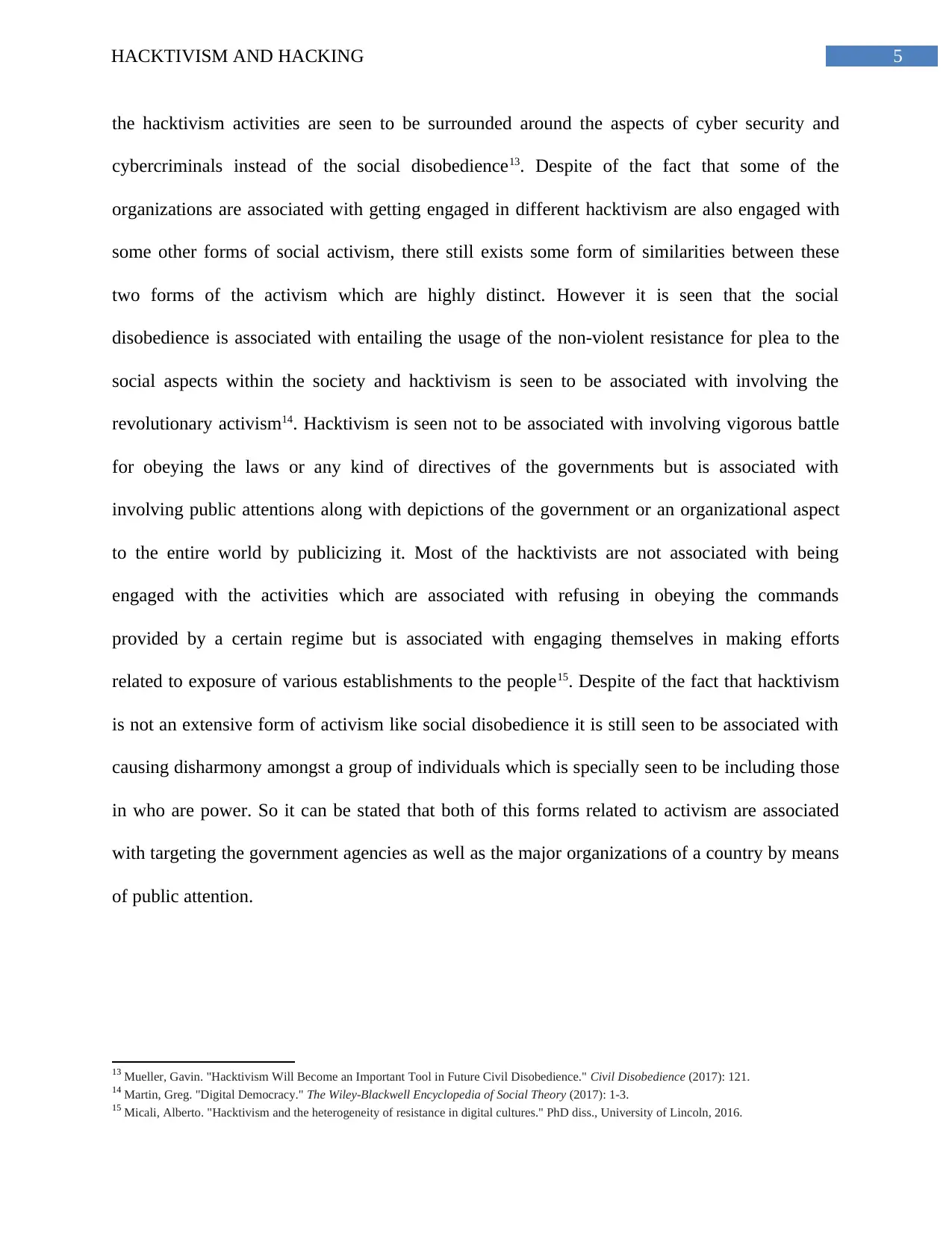
5HACKTIVISM AND HACKING
the hacktivism activities are seen to be surrounded around the aspects of cyber security and
cybercriminals instead of the social disobedience13. Despite of the fact that some of the
organizations are associated with getting engaged in different hacktivism are also engaged with
some other forms of social activism, there still exists some form of similarities between these
two forms of the activism which are highly distinct. However it is seen that the social
disobedience is associated with entailing the usage of the non-violent resistance for plea to the
social aspects within the society and hacktivism is seen to be associated with involving the
revolutionary activism14. Hacktivism is seen not to be associated with involving vigorous battle
for obeying the laws or any kind of directives of the governments but is associated with
involving public attentions along with depictions of the government or an organizational aspect
to the entire world by publicizing it. Most of the hacktivists are not associated with being
engaged with the activities which are associated with refusing in obeying the commands
provided by a certain regime but is associated with engaging themselves in making efforts
related to exposure of various establishments to the people15. Despite of the fact that hacktivism
is not an extensive form of activism like social disobedience it is still seen to be associated with
causing disharmony amongst a group of individuals which is specially seen to be including those
in who are power. So it can be stated that both of this forms related to activism are associated
with targeting the government agencies as well as the major organizations of a country by means
of public attention.
13 Mueller, Gavin. "Hacktivism Will Become an Important Tool in Future Civil Disobedience." Civil Disobedience (2017): 121.
14 Martin, Greg. "Digital Democracy." The Wiley‐Blackwell Encyclopedia of Social Theory (2017): 1-3.
15 Micali, Alberto. "Hacktivism and the heterogeneity of resistance in digital cultures." PhD diss., University of Lincoln, 2016.
the hacktivism activities are seen to be surrounded around the aspects of cyber security and
cybercriminals instead of the social disobedience13. Despite of the fact that some of the
organizations are associated with getting engaged in different hacktivism are also engaged with
some other forms of social activism, there still exists some form of similarities between these
two forms of the activism which are highly distinct. However it is seen that the social
disobedience is associated with entailing the usage of the non-violent resistance for plea to the
social aspects within the society and hacktivism is seen to be associated with involving the
revolutionary activism14. Hacktivism is seen not to be associated with involving vigorous battle
for obeying the laws or any kind of directives of the governments but is associated with
involving public attentions along with depictions of the government or an organizational aspect
to the entire world by publicizing it. Most of the hacktivists are not associated with being
engaged with the activities which are associated with refusing in obeying the commands
provided by a certain regime but is associated with engaging themselves in making efforts
related to exposure of various establishments to the people15. Despite of the fact that hacktivism
is not an extensive form of activism like social disobedience it is still seen to be associated with
causing disharmony amongst a group of individuals which is specially seen to be including those
in who are power. So it can be stated that both of this forms related to activism are associated
with targeting the government agencies as well as the major organizations of a country by means
of public attention.
13 Mueller, Gavin. "Hacktivism Will Become an Important Tool in Future Civil Disobedience." Civil Disobedience (2017): 121.
14 Martin, Greg. "Digital Democracy." The Wiley‐Blackwell Encyclopedia of Social Theory (2017): 1-3.
15 Micali, Alberto. "Hacktivism and the heterogeneity of resistance in digital cultures." PhD diss., University of Lincoln, 2016.
⊘ This is a preview!⊘
Do you want full access?
Subscribe today to unlock all pages.

Trusted by 1+ million students worldwide
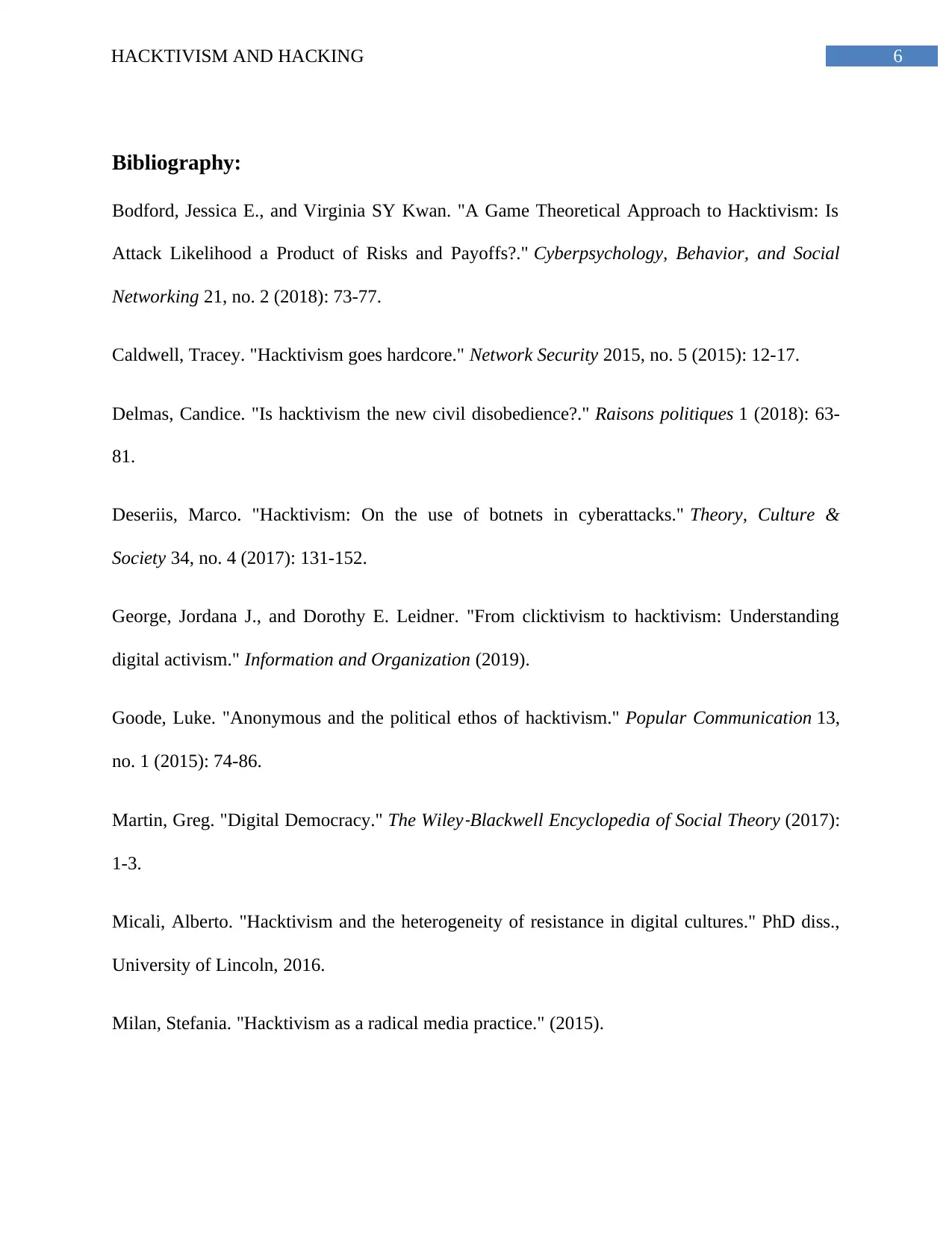
6HACKTIVISM AND HACKING
Bibliography:
Bodford, Jessica E., and Virginia SY Kwan. "A Game Theoretical Approach to Hacktivism: Is
Attack Likelihood a Product of Risks and Payoffs?." Cyberpsychology, Behavior, and Social
Networking 21, no. 2 (2018): 73-77.
Caldwell, Tracey. "Hacktivism goes hardcore." Network Security 2015, no. 5 (2015): 12-17.
Delmas, Candice. "Is hacktivism the new civil disobedience?." Raisons politiques 1 (2018): 63-
81.
Deseriis, Marco. "Hacktivism: On the use of botnets in cyberattacks." Theory, Culture &
Society 34, no. 4 (2017): 131-152.
George, Jordana J., and Dorothy E. Leidner. "From clicktivism to hacktivism: Understanding
digital activism." Information and Organization (2019).
Goode, Luke. "Anonymous and the political ethos of hacktivism." Popular Communication 13,
no. 1 (2015): 74-86.
Martin, Greg. "Digital Democracy." The Wiley
‐Blackwell Encyclopedia of Social Theory (2017):
1-3.
Micali, Alberto. "Hacktivism and the heterogeneity of resistance in digital cultures." PhD diss.,
University of Lincoln, 2016.
Milan, Stefania. "Hacktivism as a radical media practice." (2015).
Bibliography:
Bodford, Jessica E., and Virginia SY Kwan. "A Game Theoretical Approach to Hacktivism: Is
Attack Likelihood a Product of Risks and Payoffs?." Cyberpsychology, Behavior, and Social
Networking 21, no. 2 (2018): 73-77.
Caldwell, Tracey. "Hacktivism goes hardcore." Network Security 2015, no. 5 (2015): 12-17.
Delmas, Candice. "Is hacktivism the new civil disobedience?." Raisons politiques 1 (2018): 63-
81.
Deseriis, Marco. "Hacktivism: On the use of botnets in cyberattacks." Theory, Culture &
Society 34, no. 4 (2017): 131-152.
George, Jordana J., and Dorothy E. Leidner. "From clicktivism to hacktivism: Understanding
digital activism." Information and Organization (2019).
Goode, Luke. "Anonymous and the political ethos of hacktivism." Popular Communication 13,
no. 1 (2015): 74-86.
Martin, Greg. "Digital Democracy." The Wiley
‐Blackwell Encyclopedia of Social Theory (2017):
1-3.
Micali, Alberto. "Hacktivism and the heterogeneity of resistance in digital cultures." PhD diss.,
University of Lincoln, 2016.
Milan, Stefania. "Hacktivism as a radical media practice." (2015).
Paraphrase This Document
Need a fresh take? Get an instant paraphrase of this document with our AI Paraphraser
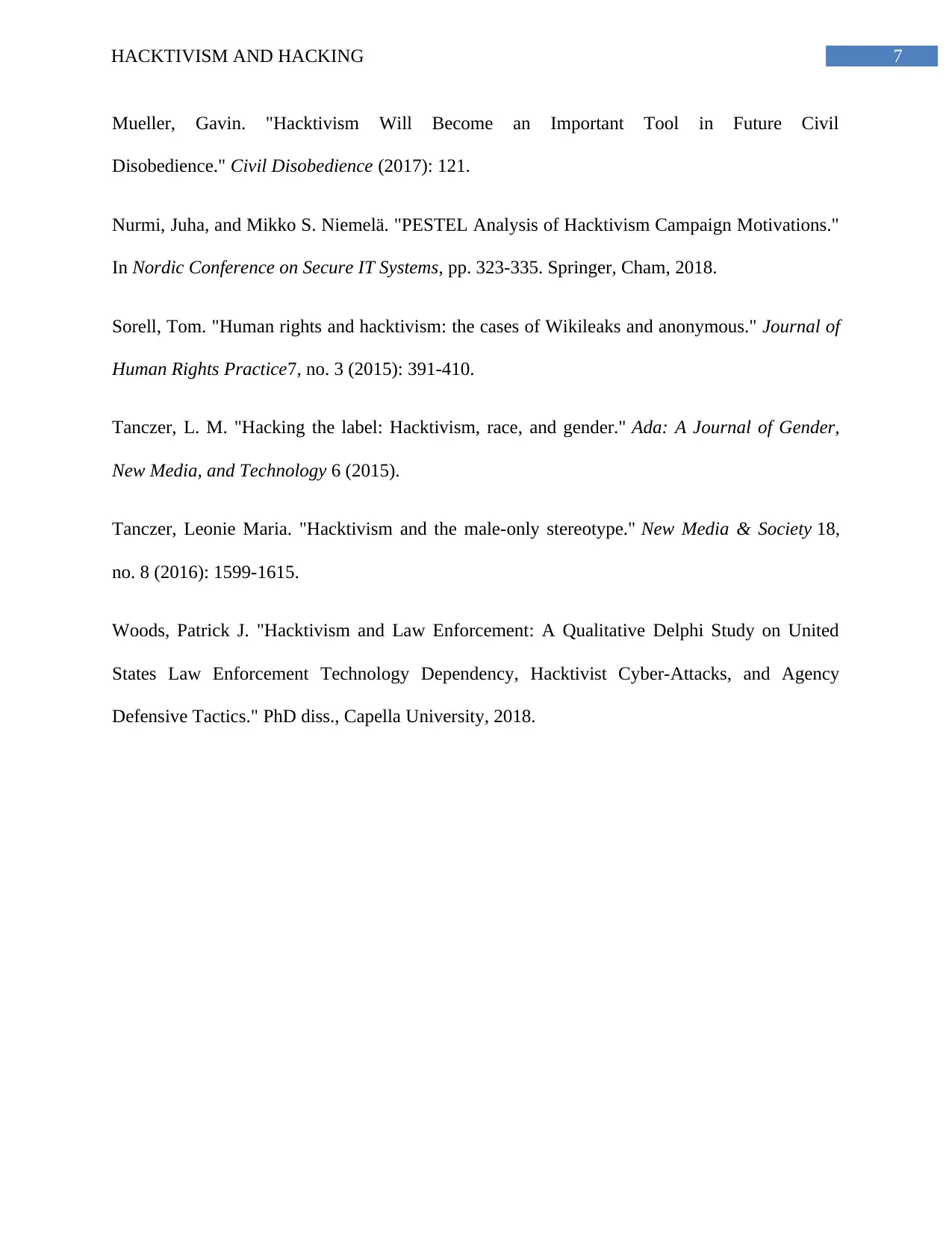
7HACKTIVISM AND HACKING
Mueller, Gavin. "Hacktivism Will Become an Important Tool in Future Civil
Disobedience." Civil Disobedience (2017): 121.
Nurmi, Juha, and Mikko S. Niemelä. "PESTEL Analysis of Hacktivism Campaign Motivations."
In Nordic Conference on Secure IT Systems, pp. 323-335. Springer, Cham, 2018.
Sorell, Tom. "Human rights and hacktivism: the cases of Wikileaks and anonymous." Journal of
Human Rights Practice7, no. 3 (2015): 391-410.
Tanczer, L. M. "Hacking the label: Hacktivism, race, and gender." Ada: A Journal of Gender,
New Media, and Technology 6 (2015).
Tanczer, Leonie Maria. "Hacktivism and the male-only stereotype." New Media & Society 18,
no. 8 (2016): 1599-1615.
Woods, Patrick J. "Hacktivism and Law Enforcement: A Qualitative Delphi Study on United
States Law Enforcement Technology Dependency, Hacktivist Cyber-Attacks, and Agency
Defensive Tactics." PhD diss., Capella University, 2018.
Mueller, Gavin. "Hacktivism Will Become an Important Tool in Future Civil
Disobedience." Civil Disobedience (2017): 121.
Nurmi, Juha, and Mikko S. Niemelä. "PESTEL Analysis of Hacktivism Campaign Motivations."
In Nordic Conference on Secure IT Systems, pp. 323-335. Springer, Cham, 2018.
Sorell, Tom. "Human rights and hacktivism: the cases of Wikileaks and anonymous." Journal of
Human Rights Practice7, no. 3 (2015): 391-410.
Tanczer, L. M. "Hacking the label: Hacktivism, race, and gender." Ada: A Journal of Gender,
New Media, and Technology 6 (2015).
Tanczer, Leonie Maria. "Hacktivism and the male-only stereotype." New Media & Society 18,
no. 8 (2016): 1599-1615.
Woods, Patrick J. "Hacktivism and Law Enforcement: A Qualitative Delphi Study on United
States Law Enforcement Technology Dependency, Hacktivist Cyber-Attacks, and Agency
Defensive Tactics." PhD diss., Capella University, 2018.
1 out of 8
Related Documents
Your All-in-One AI-Powered Toolkit for Academic Success.
+13062052269
info@desklib.com
Available 24*7 on WhatsApp / Email
![[object Object]](/_next/static/media/star-bottom.7253800d.svg)
Unlock your academic potential
Copyright © 2020–2026 A2Z Services. All Rights Reserved. Developed and managed by ZUCOL.





